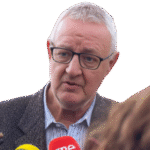In a few short weeks, 2025 has brought astounding change – and challenges – to the global economy and to the fundamental assumptions that have underpinned the global political economy since the Second World War. From seeing the USA voting alongside Russia, Belarus, and North Korea against its allies, to threats of annexation of other territories and countries, trade wars, threats of massive deportations, a nearly total cut in USA foreign aid – including to various multilateral organisations – and thousands of federal workers laid off, a shift in climate change priorities, to name just a few of the most recent changes in US politics – in less than three months. And the economic result – what appeared to be a positive outlook for the world’s economy and political stability – has changed radically for the worse.
In the USA, the economy risks entering a recession. A recession in the USA will inevitably disrupt the world economy. As Mark Zandi, chief economist at Moody’s, puts it, “This would be a really weird recession – it’s recession by design. The economy came into the year rip-roaring, exceptionally strong and we’re pushing it because of policy.” The risk of recession in the USA is now at 60 percent, estimates Zandi.
Unfortunately, economic and political instability are likely to continue, as the emerging trade war shows. Against this backdrop, Europe and the UK have taken fiscal steps that would have been seen as radical not long ago: the European Commission proposed its ReArm initiative, in Germany a historic political deal about defence investment was made, and a similar announcement was made by the UK Prime Minister.
The overall direction here is clear – a move toward a more unified Europe in terms of security policy, defence, and economic policy. Already it is evident that military equipment spending is shifting inward in the EU. Some countries are already rethinking buying the American F-35. NATO countries are looking at potential alternatives.
Europe and other NATO countries are already diversifying their trading partners. The EU and Mexico concluded negotiations to modernise their trade agreement on January 17, 2025. The same applies to the EU with Chile. The EU has rushed and ended a 25-year negotiation and signed the trade deal with Mercosur. In addition, a trade deal between the EU and India is meant to be concluded towards the end of this year. The EU is also speeding up trade negotiations with Indonesia and the Philippines and has restarted talks with Malaysia. Canada has concluded deals with Indonesia and Ecuador.
But security is more than weapons and prosperity. It is more than trade policy. It is clear to us that the decline in political stability in Europe is, in substantial part, a result of austerity and the attacks on the welfare state and on workers’ rights that accompanied austerity. And looming over all these events is the existential security threat of climate change. Strengthening the welfare state and rebuilding the place of working people in Europe’s political economy is a prerequisite for the political cohesion that must underlie both any effective European security policy and an aggressive European response to the threat of climate change.
Europe also has to recognise that a more aggressive state response is required at every level of government around public goods like housing and health. This is at the heart of much of the public dissatisfaction around democracy itself.
Given the USA’s withdrawal from global development policy and from its recent climate leadership role, the EU really must step up to fill the global leadership vacuum. That requires streamlining and strengthening Europe’s current development policies. The EIB and other development banks are important but rely on triple A ratings, which prevent them from financing riskier projects. To address the intertwined and growing crises of development finance and climate change that will only grow in the absence of leadership, the EU and the UK must develop their relationships with the growing emerging market giants i.e. India, Indonesia, Brazil, and South Africa.
The US withdrawal from climate commitments, the dismantling of USAID and its consequences all over the world, the US stance in relation to Canada, Greenland, and the Panama Canal, and the continuing shifts in policy regarding Russia’s invasion of Ukraine and the Israeli-Palestinian conflict will inevitably lead to geopolitical changes. As a matter of first-order effects, these events clearly pose real challenges for Europe’s welfare states and equally for its role in the world. This is the time to step up on defence but also to keep up the momentum on the green and digital revolutions, and to be more ambitious when it comes to Europe’s role in the world.
We write as Europeans and Americans committed to the transatlantic alliance. But we also write as people committed to defending democracy, taking urgent action to decarbonise in the face of the threat of climate change, and addressing longstanding inequities in the global economy that compound these challenges. It is clear that political uncertainty means that European strategic leadership on these critical global questions is no longer optional.
Ironically, President Trump may well, in the end, contribute more to Europe’s strengthening and political unification and to a more balanced geopolitical world than many of Europe’s leaders have. But it is imperative that progressive leaders from both sides of the Atlantic start building the basis of what needs to become a progressive and alternative transatlantic alliance, one based on a politically trustworthy, economically vigorous transatlantic alliance that supports greater levels of economic fairness and security both in Europe and America and in global society as a whole.
Trump will leave but the transatlantic alliance will stay. There is no going back to the combination of financialisation and austerity that did so much damage to democracy. The path forward to effective and sustainable multilateralism must harken back to the original values that motivated the Bretton Woods institutions and the EU – creating a framework for shared prosperity that can effectively support stable and effective democratic governance. No effective multilateralism will exist without it.







